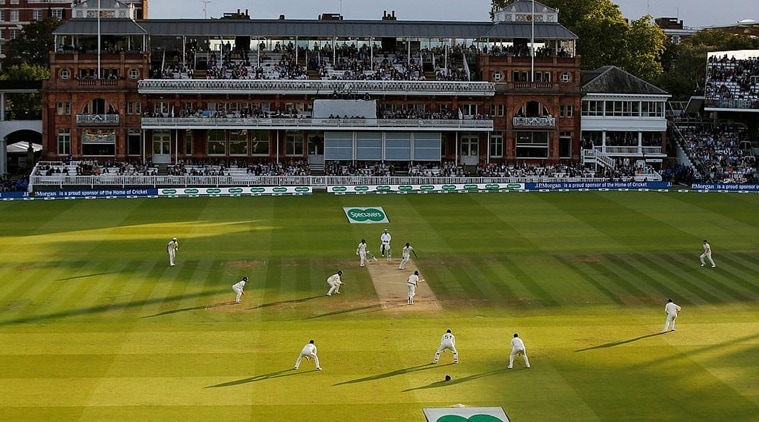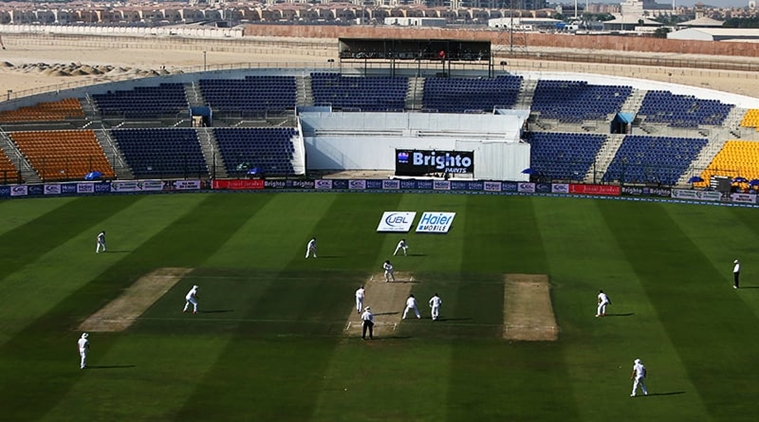 The ECB could host the six Tests against West Indies and Pakistan at two venues – Ageas Bowl and Old Trafford. (Source: Reuters)
The ECB could host the six Tests against West Indies and Pakistan at two venues – Ageas Bowl and Old Trafford. (Source: Reuters)
The United Kingdom is mulling a mid-June restart of the Premier League after the suspension caused by the coronavirus pandemic and cricket is also exploring a return to action without fans in attendance.
The England and Wales Cricket Board is considering options to host home series against West Indies and Pakistan in July-August. According to a report in The Guardian, England players would be asked to assemble at the Ageas Bowl on June 23 and they might have to stay away from their families for nine weeks until the end of the third Test against Pakistan, scheduled from August 20. The first Test against West Indies might commence on July 8.
As per the report, the ECB could host the six Tests at two venues – Ageas Bowl and Old Trafford – and during the entire period, players would be subjected to daily temperature checks, regular Covid swabs, and other bio-security measures. Also, an expanded squad comprising 30 players could be chosen with an eye to rotation.
Apart from six Tests, six ODIs and as many T20 Internationals are also on the roster. The limited-overs itinerary includes three ODIs against Ireland at the end of July followed by three T20Is against Pakistan after the Test series and then three ODIs and three T20Is against Australia in September.
In India however, the BCCI is willing to wait. Given that the domestic season starts in August-September, the board still has a few months to make a decision. It doesn’t want to put its cricketers into any health risk, regardless of bio-secure arrangements.
“We aren’t considering anything (like that), as of now. We will wait for the government guidelines. We won’t put our players in a health hazard. We would be very cautious,” BCCI treasurer Arun Dhumal told The Indian Express.
There’s an overwhelming agreement in the BCCI that even with all the precautions and ‘bio-security’, playing cricket, while the Covid-19 curve is still steep, is fraught with risk. Going back to England, The Times reported that a group of players were briefed by the ECB about its plans on Tuesday. They were told to minimise physical contact including handshakes on and off the field, also in the team bus, when cricket returns. It needs to be seen if, like the Premier League, the ECB makes any move to have private companies on board to provide test kits.
Sports bodies in England have swung into action after the UK government gave their ‘project restart’ a positive consideration. Also, as Foreign Secretary Dominic Raab mentioned, return of sport would lift the morale of a beleaguered nation that has suffered the highest number of coronavirus deaths (over 30,000) in Europe. “I think it would lift spirits of the nation and people would like to see us get back to work and children can go to school safely but also pastimes like sport,” Raab said during a government press conference.
Loss of revenue is a major reason why sports authorities are keen to have a restart at the earliest. The Premier League stares at a £1 billion black hole if the season is voided. Similarly, ECB chief executive Tom Harrison has told MPs that this is the “most significant financial challenge we have ever faced”, with potential losses of £380 million for a ‘zero’ cricket season.
Australia’s single-venue plan
Cricket Australia (CA), meanwhile, has already started planning about cricket in isolation for their home Test series against India in December-January. CA chief executive Kevin Roberts has spoken about the possibility of hosting the series, which is worth $300 million, at a single venue – Adelaide Oval – and behind closed doors. “Whether or not there are people at the venue or not; we will explore all viable options. Fortunately, we have a little bit of time to work through the different scenarios with the India series. But we are not ruling out any possibility for that at this point in time,” Roberts had said during an interaction with the media via video conference last month.
A 138-room premium boutique hotel at Adelaide Oval, which is scheduled for a September opening, reportedly could offer the Indian team a potential quarantine centre. Whether the BCCI would agree to play Test cricket in such a deadpan atmosphere remains a question.
“To start with, it depends on our government’s policies. To travel abroad and coming back, you need the government’s permission. Then, office-bearers will sit with the team management and players to discuss the issue,” a BCCI functionary said.
****
Daily temperature checks, onsite hotels
 As measures, England’s Test cricketers have been told to expect daily temperature checks, regular swabs, weekly Covid-19 tests, and possibly nine weeks away from their families. (Source: File Photo)
As measures, England’s Test cricketers have been told to expect daily temperature checks, regular swabs, weekly Covid-19 tests, and possibly nine weeks away from their families. (Source: File Photo)
In sport’s resumption bid to avert a financial meltdown, bio-secure stadiums will be the imminent future. Like the ECB, which is deliberating on getting the season underway, with Tests against Windies and Pakistan.
Secure stadiums: As the word implies, it’s playing in conditions that are entirely infection-free, where all those involved, from players and support staff to officials, are tested for Covid-19 in advance and then kept in a “bio-secure” environment, sealed off from the outside world. Only people who were virus-free or have immunity are allowed into the bubble. Most football leagues in Europe and the ECB have been busy identifying stadiums that can be converted into a bio-secure bubble, self-sustainable venues with onsite hotel and training facilities in those areas that have a relatively reduced incidence rate.
ECB’s outline: The ECB believes that two of their venues, Old Trafford and Ageas Bowl could fulfil the criteria of bio-secure venues. The two grounds have their on-site hotels, the Bowl has a well-being centre too, spacious enough to accommodate both teams, their entourage of support staff, match officials and broadcast crew. The Bowl’s health centre could be used to provide players, backroom staff, administrators and media with skin prick tests on their way into the ground.
Apart from the standard practices of social distancing, England’s Test cricketers have been told to expect daily temperature checks, regular swabs, weekly Covid-19 tests, and possibly nine weeks away from their families. After initial testing, they would spend the first-week training in small groups before an inter-squad match that serves as a warm-up for the first Test against West Indies. The matches will be played on the practice wickets of the Bowl or on neighbouring club grounds. Also, the ground and hotel staff will operate in small groups with another set on the standby. If one of the staff gets infected, the entire team will be put under quarantine while the new group takes over.
Challenges: A possible hurdle for ECB is testing, as the country is struggling to get tests for even frontline NHS staff. So to conduct tests on an estimated 200-300 people every week could be quite daunting.